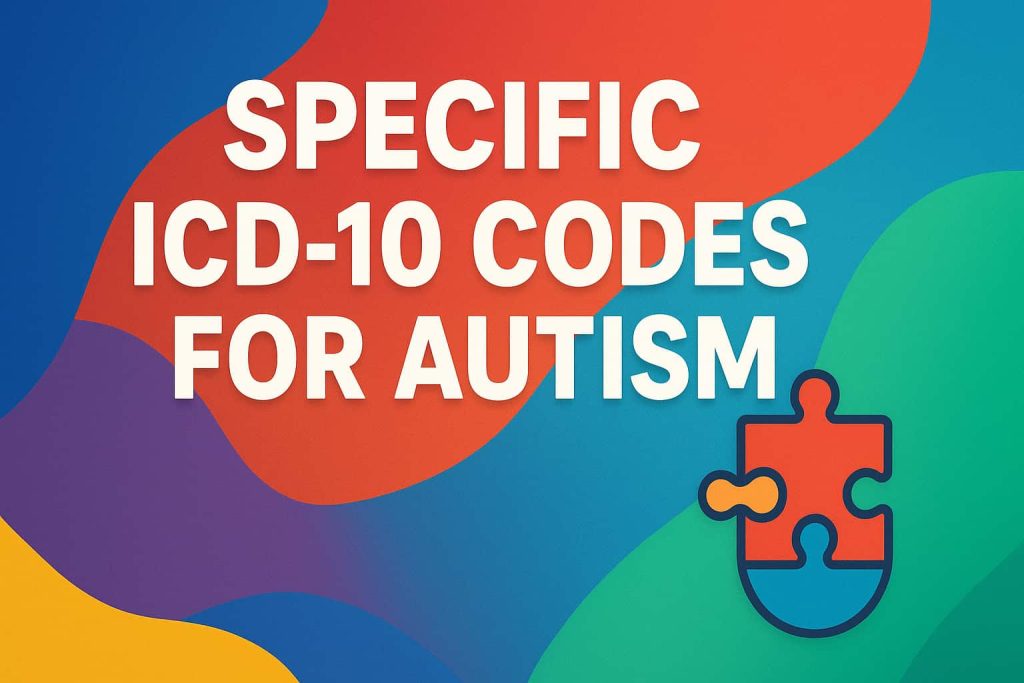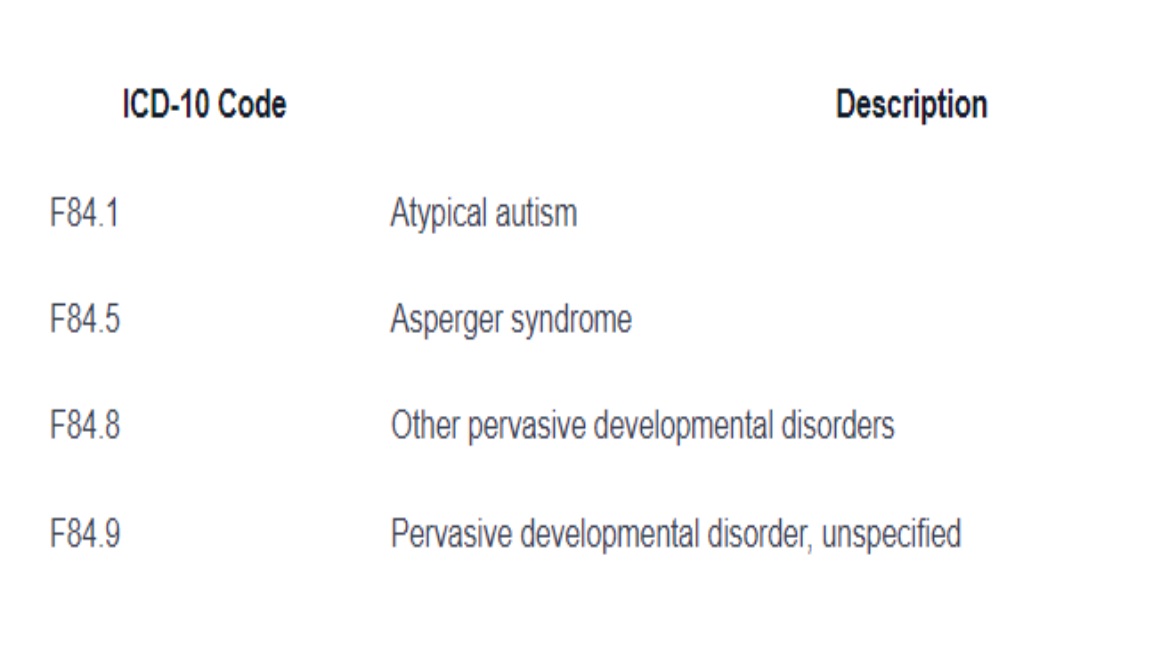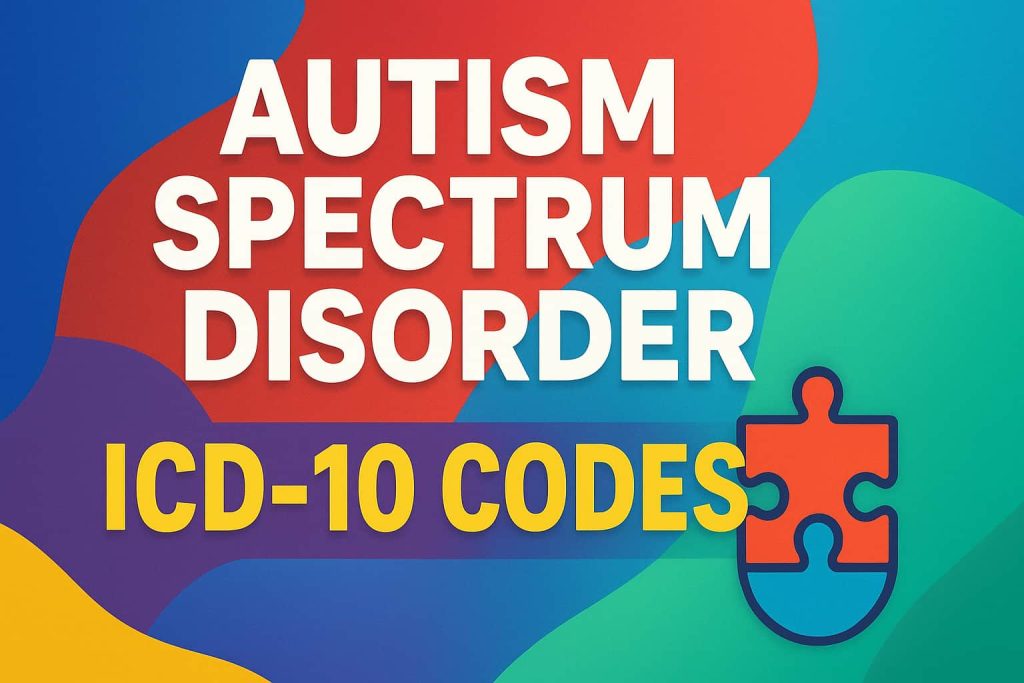Are you feeling overwhelmed trying to navigate the complex world of medical codes? If you’re searching for information on Autism Spectrum Disorder ICD-10 codes, you’re in the right place.
Understanding these codes is crucial for accurate diagnosis, treatment planning, and insurance billing. But deciphering them can feel like cracking a secret code. This guide is designed to simplify things for you, breaking down everything you need to know into bite-sized, easy-to-digest pieces.
Dive in, and discover how these codes can empower you in managing Autism Spectrum Disorder more effectively.
What Is Autism Spectrum Disorder?
Autism Spectrum Disorder affects how a person communicates and interacts. The ICD-10 codes help doctors classify and diagnose it. These codes ensure that patients receive the right care and support.
What is Autism Spectrum Disorder? Autism Spectrum Disorder (ASD) is a developmental condition that affects how a person communicates, behaves, and interacts with others. People with ASD often experience challenges with social skills, repetitive behaviors, speech, and nonverbal communication. It’s a spectrum, meaning symptoms and their severity can vary widely.
Understanding Asd
ASD is not a single condition but a range of closely related disorders with similar symptoms. Some individuals might face significant challenges in their daily lives, while others could be highly skilled in specific areas. The common factor is a different way of perceiving the world.
Signs And Symptoms
Symptoms typically appear in early childhood, often before age three. These might include avoiding eye contact, delayed speech, or difficulty understanding social cues. Some children may also show intense interest in specific topics, lining up toys, or needing a strict routine.
Causes Of Autism Spectrum Disorder
The exact cause of ASD is still unknown. However, research suggests a combination of genetic and environmental factors plays a role. Many parents wonder why their child develops ASD, but it’s crucial to remember it’s nobody’s fault.
Diagnosis And Icd-10 Codes
Diagnosing ASD can be complex. Professionals use a combination of behavioral assessments and standardized tests. The ICD-10 codes for autism help healthcare providers categorize and record diagnoses. For example, F84.0 is used for childhood autism, while F84.5 is for Asperger’s syndrome.
Living With Asd
Living with ASD can be challenging, but many find ways to lead fulfilling lives. Support from family, friends, and professionals can make a significant difference. Remember, every individual’s experience with autism is unique, and understanding their perspective is key.
Making A Difference
You can make a difference by educating yourself and others about ASD. Simple actions like being patient, offering support, and showing empathy can have a significant impact. How can you help create a more inclusive environment for those with ASD?
Introduction To Icd-10 Codes
Autism Spectrum Disorder (ASD) presents unique challenges in understanding and diagnosing. The International Classification of Diseases (ICD) offers a systematic approach to health conditions. The ICD-10 codes are vital for medical professionals. They help in diagnosing and treating Autism Spectrum Disorder. Understanding these codes can aid in better healthcare services. This section explores the ICD-10 codes related to ASD.
Icd-10 Code Basics
The ICD-10 codes classify health conditions globally. They provide a standardized language for healthcare professionals. This ensures consistency in diagnosis and treatment. These codes are essential for doctors, researchers, and policy-makers. They help in tracking disease patterns and healthcare planning.
Significance Of Icd-10 Codes For Autism Spectrum Disorder
ICD-10 codes for ASD help in identifying the disorder accurately. They enable professionals to provide tailored treatment plans. Accurate coding ensures better understanding of the patient’s needs. It also aids in gathering data for research and development.
Icd-10 Codes Specific To Autism Spectrum Disorder
F84.0 is the ICD-10 code for Autistic Disorder. This code covers various developmental challenges. These include social interaction difficulties and communication issues. Each code in the F84 series addresses specific aspects of ASD. This detailed classification helps in precise diagnosis and care.
The Role Of Icd-10 Codes In Treatment And Research
ICD-10 codes play a crucial role in ASD treatment. They guide professionals in formulating effective care plans. These codes also facilitate research by providing structured data. Researchers can analyze trends and develop new interventions.
Challenges In Using Icd-10 Codes
Understanding and applying these codes can be complex. Professionals need training to use them effectively. Misinterpretation can lead to incorrect diagnosis. This highlights the need for ongoing education and updates.
Icd-10 Code Structure
Autism Spectrum Disorder (ASD) is a complex condition. Its diagnosis can be challenging. The ICD-10 code structure helps organize various medical conditions. This structured system aids in tracking and diagnosing health issues like ASD. Understanding this structure can be crucial for healthcare professionals and patients.
Code Format
The ICD-10 code format is detailed and specific. Each code starts with a letter followed by numbers. This combination identifies different health conditions. For ASD, the codes fall under a mental health section. Codes are designed to represent specific disorders within the spectrum. They help in pinpointing exact conditions and symptoms.
Purpose And Use
The ICD-10 codes serve multiple purposes. Primarily, they standardize diagnoses across healthcare systems. This standardization aids in communication among professionals. Codes help in research and understanding disease prevalence. They are used in billing and insurance claims. Accurate coding ensures proper patient treatment and care.
Understanding these codes is vital for proper diagnosis. It allows for better management of Autism Spectrum Disorder. Utilizing the ICD-10 codes enhances healthcare delivery. It ensures patients receive the best possible care.
Specific Icd-10 Codes For Autism
Autism Spectrum Disorder is identified with specific ICD-10 codes such as F84. 0 for Childhood Autism. These codes help healthcare professionals diagnose and classify the disorder accurately, ensuring appropriate treatment and support. F84. 5 and F84. 9 represent Asperger’s Syndrome and unspecified pervasive developmental disorder, respectively.

Understanding the specific ICD-10 codes for Autism Spectrum Disorder (ASD) can be crucial for healthcare professionals, educators, and even families. These codes help in diagnosing, documenting, and researching autism effectively. They provide a standardized way to communicate about the condition, ensuring everyone is on the same page.
F84.0 Childhood Autism
F84.0 is the code used for childhood autism, a condition often recognized in children by the age of three. This code identifies classic autism, which is characterized by challenges in communication, social interaction, and repetitive behaviors. If you’ve ever noticed a child who seems withdrawn or struggles to communicate with peers, understanding this code can be a step towards seeking appropriate help. ###
F84.1 Atypical Autism
F84.1 refers to atypical autism, which differs from childhood autism mainly in its age of onset or atypical symptoms. Atypical autism might not fit the full criteria for childhood autism but still requires attention and support. Have you ever wondered why some symptoms appear later or differently? This code might provide some answers, encouraging tailored interventions.
F84.5 Asperger’s Syndrome
F84.5 is the code for Asperger’s Syndrome, a condition where individuals often have average or above-average intelligence but face social challenges. People with Asperger’s may excel in specific areas but struggle with social cues or forming friendships. If someone in your life is particularly gifted yet socially awkward, understanding this code might help in providing the right support. Recognizing these codes can make a significant difference in identifying and supporting individuals with ASD. They not only aid in diagnosis but also in building a community that understands and supports each other. Are you familiar with these codes in your practice or personal life? They might be the key to opening doors to much-needed resources and understanding.
Differences Between Icd-10 And Dsm-5
Autism Spectrum Disorder (ASD) diagnosis relies on different systems. The ICD-10 and DSM-5 are the two main ones. They offer unique approaches to diagnosing ASD. Understanding their differences is key for professionals.
Diagnostic Criteria
The ICD-10 uses a broad approach for ASD criteria. It focuses on general behavioral patterns. The DSM-5 has specific guidelines. It emphasizes detailed symptoms. DSM-5 criteria are more flexible. They allow for individual variations.
Classification Variations
ICD-10 categorizes ASD under pervasive developmental disorders. It groups various conditions together. DSM-5 classifies ASD as a single disorder. It integrates conditions like Asperger’s into one category. This shift in DSM-5 simplifies diagnosis.

Credit: www.researchgate.net
Global Implications Of Icd-10 Codes
Understanding the global implications of ICD-10 codes, especially regarding Autism Spectrum Disorder (ASD), is crucial for ensuring consistent and effective healthcare worldwide. These codes are not just numbers; they are tools that bridge gaps across healthcare systems, facilitate research, and enhance data collection. By standardizing how ASD is identified and recorded, ICD-10 codes enable better tracking of trends and improve the overall quality of care.
Healthcare Systems
ICD-10 codes play a pivotal role in harmonizing healthcare systems around the globe. They ensure that a diagnosis of Autism Spectrum Disorder is understood the same way whether you’re in New York or New Delhi. This uniformity helps in streamlining treatment plans, ensuring patients receive appropriate care no matter where they are.
Imagine navigating a healthcare system in a foreign country with a child diagnosed with ASD. With ICD-10 codes, communication barriers are minimized as healthcare professionals can access standardized information quickly. This not only saves time but also potentially improves outcomes for your loved ones.
Research And Data Collection
Accurate data collection is at the heart of any meaningful research. ICD-10 codes allow for precise tracking of ASD cases, fostering a more comprehensive understanding of its prevalence and impact. This data can inform public health policies and funding decisions, leading to better support systems for individuals with ASD.
Researchers can analyze trends over time, assessing the effectiveness of interventions and identifying areas needing further exploration. Have you ever wondered how global health policies are shaped? It often starts with the data collected through these codes, providing evidence that drives change.
Moreover, the codes facilitate international collaboration among researchers. Sharing data across borders becomes more manageable, enabling breakthroughs that might not be possible in isolation. How might this affect future generations? Perhaps the standardized data will lead to earlier diagnoses and more effective treatments for ASD globally.
Challenges In Using Icd-10 For Autism
Navigating the complexities of ICD-10 for Autism Spectrum Disorder presents unique challenges. The codes lack specificity, making diagnosis difficult. This can lead to inconsistent treatment plans for individuals with autism. Proper understanding and application of these codes are essential for effective care.
Autism Spectrum Disorder (ASD) is a complex condition that requires accurate diagnosis and coding for effective treatment and support. However, using ICD-10 codes for autism presents several challenges that both healthcare professionals and families must navigate. Understanding these challenges is crucial for improving the care and outcomes for individuals with autism.
Complexity Of Diagnoses
Diagnosing autism spectrum disorder isn’t straightforward. The ICD-10 includes various codes that attempt to cover the diverse presentations of autism. However, these codes often fall short in capturing the full range of symptoms and behaviors. This can lead to misdiagnosis or incomplete diagnosis, affecting the support and resources you or your loved ones might receive. Imagine trying to fit a diverse set of individual experiences into a rigid coding system. It’s like trying to fit a square peg in a round hole. The complexity of autism requires more nuanced approaches than the ICD-10 currently allows.
Updating To Icd-11
The transition from ICD-10 to ICD-11 offers hope for a more accurate representation of autism spectrum disorder. ICD-11 aims to provide codes that reflect the varied nature of autism better. This update is expected to offer more detailed categories and descriptions. It can lead to improved diagnosis, treatment, and support options. But how smooth will this transition be for healthcare systems worldwide? Will it truly address the gaps left by ICD-10? These are questions that professionals and families should keep in mind. The new coding system promises improvements, but its effectiveness will depend on how well it’s implemented and embraced by practitioners.

Credit: www.discoveryaba.com
Future Of Autism Coding
Exploring the future of Autism Spectrum Disorder coding involves understanding ICD-10 codes. These codes help classify autism symptoms and behaviors for better diagnosis. Streamlined coding practices can enhance healthcare professionals’ ability to identify and treat autism effectively.
The future of autism coding holds exciting possibilities for better healthcare. Enhancements in coding can lead to improved diagnosis and treatment. Understanding these changes is crucial for both healthcare providers and families.
Transition To Icd-11
The International Classification of Diseases is evolving. ICD-11 brings new updates for autism coding. It offers a more comprehensive framework. This transition aims to refine diagnostic criteria. More detailed categories help healthcare professionals. It ensures accurate assessments and tailored interventions. ICD-11 focuses on various autism manifestations. It considers individual differences and needs. This approach supports personalized care plans. Better coding can enhance resource allocation. It helps in tracking prevalence and outcomes. A global standard promotes consistency in diagnosis.
Potential Improvements
ICD-11 could enhance clarity in autism diagnosis. It aims to simplify the coding process. Easier codes mean less room for errors. Improved coding helps in research and data collection. It supports better understanding of autism patterns. The new system can improve patient records. It allows for detailed documentation of symptoms. This aids in identifying effective treatments. Better coding promotes communication among healthcare teams. It ensures everyone is on the same page. Advancements in coding may lead to faster diagnosis. Early detection can result in timely interventions. Families benefit from streamlined processes. ICD-11 offers a promising future for autism care.

Frequently Asked Questions
What Is The Icd-10 Code For Autism Spectrum Disorder?
The ICD-10 code for autism spectrum disorder is F84. 0. This code is used for diagnostic purposes. It helps in identifying and categorizing autism in medical records. Proper coding ensures accurate communication between healthcare providers and insurance companies.
What Is The Diagnosis Of Autism Spectrum Disorder?
Autism spectrum disorder diagnosis involves evaluating communication, social skills, and behavior through observation and standardized tests. Professionals may include psychologists, psychiatrists, and pediatricians. Early diagnosis can lead to effective intervention and support.
What Is Autism Spectrum Disorder Icd-10 Code F84 0?
The ICD-10 code F84. 0 represents autism spectrum disorder. It characterizes difficulties in social interaction, communication, and restricted, repetitive behaviors. Early diagnosis and intervention are crucial for better outcomes. This code helps healthcare providers classify and manage the condition effectively.
What Is The Icd-10 Code For F80 82?
ICD-10 code F80. 82 refers to Social Pragmatic Communication Disorder. It involves difficulties with social communication and interaction. This condition affects verbal and nonverbal communication in social settings. Accurate diagnosis is crucial for effective treatment and support. Always consult healthcare professionals for proper diagnosis and guidance.
Conclusion
Understanding ICD-10 codes for Autism Spectrum Disorder is crucial. These codes help in diagnosis and treatment. They guide healthcare professionals. Proper coding ensures accurate patient records. It also aids in insurance claims. Families benefit from clear information. They receive better support and resources.
Awareness of these codes improves healthcare outcomes. It simplifies communication among doctors, patients, and insurers. Knowledge empowers families and caregivers. It helps them advocate effectively. Staying informed about these codes is essential. It supports comprehensive care for individuals with autism.
